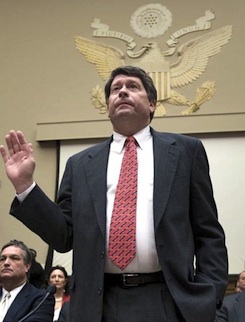
Stewart Parnell, the 68-year former peanut industry executive who 13 years ago was caught shipping peanut butter and pastes that he knew were contaminated, won’t be getting out of prison until 2038 when he’ll be 84 years old.
Judge W. Louis Sands of the he Middle District of the U.S. District Court in Georgia has upheld the findings of Magistrate Judge Thomas Q. Langstaff, denying Stewart Parnell’s “Motion to Vacate, Set Aside, or Correct his sentence Under (Motion 2255).”
Parnell’s filing three years ago of the federal habeas corpus motion, which claimed his imprisonment is unlawful, was likely his last chance to get out of jail early. He is serving his time at the high-security federal lockup at Hazelton, WV, which inmates call “Misery Mountain.”
Parnell, once president of the now-defunct Peanut Corporation of America, was indicted in 2013 for numerous federal felonies. All charges involved the 2008-09 multistate Salmonella Typhimurium outbreak that sickened thousands in at least 46 states and may have contributed to nine deaths in Idaho (1), Minnesota (3), North Carolina (1), Ohio (2), and Virginia (2).
After a 34-day trial in 2014, a Middle District federal jury found Parnell guilty of all but one count of wire fraud. For the many guilty counts, including fraud and conspiracy and introducing adulterated and misbranded food into interstate commerce with intent to defraud among numerous other felonies, Parnell was sentenced in 2015 to 28 years in federal prison to be followed by three years of supervised release.
Parnell was freed from paying any restriction for the deadly outbreak. The same outbreak was largely responsible for Congress in late 2010 passing the Food Safety Modernization Act, which President Obama signed Jan.4, 2011.
Parnell did appeal his conviction to the U.S. Court of Appeals for the 11th Circuit, but the trial court’s findings were upheld. That left Parnell with only the habeas corpus motion left to pursue.
Parnell filed the the 2255 Motion on Sept. 6, 2019, alleging 1) infective assistance of his trial counsel because counsel failed to move to change the venue and failed to strike a juror for cause and 2) these two errors constituted structural error.
Parnell also asked for an evidentiary hearing, which the Magistrate judge permitted and conducted during two days in May 2021. Parnell was taken to that hearing in federal custody by U.S. Marshals.
Defense attorneys from the historic 2014 jury trial offered testimony during the evidentiary hearing, but Magistrate Langstaff didn’t hear anything that caused him to think that Parnell’s legal counsel was insufficient. In April, he said Parnell’s motion should be denied.
Through his attorneys, Parnell filed “timely” objections to Langstaff’s report, leaving the final say to Judge Sands, who was also the 2014 trial judge who sentenced Parnell in 2015. Since that trial, Sands became a senior status judge in Georgia’s Middle District of the federal court.
Sands found that Parnell failed to show that his defense lawyers did anything unreasonable in not going for a change of venue and that the decision prejudiced him. Parnell’s defense team decided not to pursue a change of venue and it was a reasonable choice, Sands and Langstaff both agreed.
Parnell also argued that at trial his defense team failed to strike certain jurors for cause, but Sands says the petitioner fails to make that case as well. “In the Recommendation, Judge Langstaff found that counsel decided not to move to strike jurors who heard about deaths because jurors expressed that they could be impartial and counsel believed that moving to strike them would be futile,” Sands writes in the final denial.
Finally, Judge Sands finds that Parnell has failed to “make a substantial showing of the denial of a constitutional right,” causing him to deny any appealability of this final decision
Parnell was an active court case for most of the past decade, but that appears to end with this final filing by Judge Sands. Any future decisions about Parnell’s status likely will be administrative, not judicial.
Nor do the recently issued Bureau of Prisons “Compassionate Release ” guidelines give Parnell much hope for an early release. The only out might be “terminal illness” or “debilitated” condition “with no hope of recovery.”
Brother Michael Parnell, the co-defendant in the 2014 trial, is waiting for a final decision on his Motion 2255 petition.
(To sign up for a free subscription to Food Safety News, click here)
